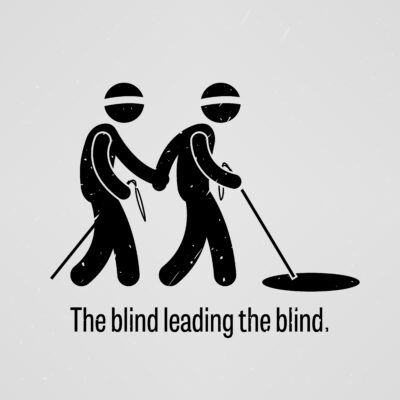

Until the 17th century, the multi-millennium long quasi-stagnation of humankind, since we left hunting-gathering for agriculture, did not make this pronouncement ominous for the long-term sustainability of our civilization. Everything changed with the industrial revolutions, the avowed dominion of Humans on Nature, already in many Creeds but heavily theorized during the Enlightenment.

Bruno Latour, the late French philosopher, who joined James Lovelock, the British independent scientist, in coining in modern times the term Gaia for our planetary environment, made this interesting comment in a 2018 paper, regarding our politicians: “the blind leading the blind”.
This lead to a relentless, and sort of blind, plundering of fossil, and other scarce, resources (gobbling up most of the coal accumulated in the 60 million years of the Carboniferous era in just three centuries), so as to feed an unheard-of growth that has taken our species to grow and multiply to 8 billion. It also made the CO2 content rise in the atmosphere. The Earth System has responded with climate change, a natural event that happened in prehistoric times, upward and downward, when humanity was not around to deal with it. Habitability of the planet may evolve as a consequence, unless we find ways and means to adapt, slow down or reverse the momentum we have created. Which is where blindness does not help.
Climate change is no exact science, yet. No-one knows which consequences the Earth System has in store with the greenhouse gas (GHG) flight and what is clearly a planetary problem faces two distinct dynamics: In the Global West, or North, a growing worry that our living standards have reached a summit and will soon start to decrease, from regulatory imposed frugality (desire less!) or from the increased cost to switch to more sustainable means of subsistence.
In the Global South, that growth, proxy of a right to development, toward the Western modernity, embraced nearly everywhere in the post-colonial second half of the 20th century, may be denied. Both bearing consequences aggravated by growing inequalities. Both not being popular, a true understatement.
Non-elected powers that be, the European Commission or the United Nations, call for ambitious and grand plans to fight or adapt to climate change, along with social and climate justice, when politicians on the ground, democratically elected, therefore more than often looking for re-election, or self-appointed autocrats, looking to stay in charge, have to navigate against what their constituencies feel as an unfair predicament. Which explains what some criticize as procrastination or unacceptable delaying of difficult decisions. But also comes from the uncertainty of what is to be done.
For the Anthropocene, or Capitalocene or Econocene, depending on your political sensitivity, has multi-faceted negative consequences, not fully understood, on biodiversity, water resources and soil quality, key to feeding humans, and the universal solution to substitute renewable energy to fossil, the present response to increasing GHG atmospheric content, may be quite partial, when it is not creating other negative consequences, like increased minerals scarcity or land artificialization, and does not even start to address the subject of our sheer number on the planet, each and every-one expecting to be living a decent number of decades, decently, affluently that is.
As in any crisis or transition, the first phases to go through are denial and disdain. To overcome those, we must be humble and open to whatever science has to offer, however limited it may be, in order to lay out, as honestly as possible, the State of the Union of our planet when it comes to its management, or its husbandry. As horrific as it may look, disbelief and discount must not settle in, or we will not be able to educate everyone to the seriousness of the prognosis. To get the acceptance of what is to be done, and propose a global solution as one, breaking the fragmentation of the Nations we have today. But communication of science-based facts is no easy task in the era of social media.
Next comes the discovery phase, mapping out the solutions at hand: solutions with an “s”, as no-one can seriously believe we have a silver bullet immediately at hand to solve the complexity of our industrial civilization.
Trial and error, imperfect and temporary solutions, are likely, but should not discourage us to progress. To speed up the process, as exponential acceleration of climate change does not give us much time to react, we should not lose time in red tape, like permitting.
Honestly assess the situation, address everything, everywhere, all at once (the big winner of this year Oscars Ceremony), without further ado, should buy us time before facing millions of climate refugees, a repeat of the mass migrations we suffered from in Europe between the two world wars, though from a different cause, totalitarian politics, but with a lot of misery nonetheless.
Philippe Marchand is a Bioenergy Steering Committee Member of the European Technology and Innovation Platform (ETIP).